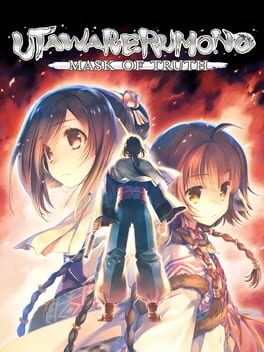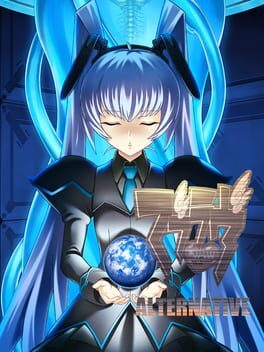Untagged spoilers (may also temp block just in case), overly argumentative (personality-wise, not because of specific videogame opinions) or bigot means a block.
—
5/10 (2.5 stars) is the average or neutral for me, anything above is positive, anything below is negative to various extents. My favs besides #1 are often affected by my most recent hyperfixations. I haven't finished SakuToki yet, but I have SakuToki's cover here because it's prettier than SakuUta's.
—
I don't mind socialising, but I primarily log & review games here in order to create good faith reviews and notes for myself. There's a reason I don't use Twitter, I don't care about media "debates" where people have a contest over who is more obnoxious through "better media taste". I just like what I like. I have disabled comments on my reviews from non-mutuals on this website due to how often provocative, bad faith, one-liner Twitter, Reddit or 4chan/Discord-like "arguments" are made here under everything.
—
Bigots, lolicons: DNI
Badges

Treasured
Gained 750+ total review likes

Organized
Created a list folder with 5+ lists

Famous
Gained 100+ followers

Adored
Gained 300+ total review likes

Pinged
Mentioned by another user

Listed
Created 10+ public lists

GOTY '23
Participated in the 2023 Game of the Year Event

Elite Gamer
Played 500+ games

Loved
Gained 100+ total review likes

Trend Setter
Gained 50+ followers

Gone Gold
Received 5+ likes on a review while featured on the front page

Donor
Liked 50+ reviews / lists

Well Written
Gained 10+ likes on a single review

Liked
Gained 10+ total review likes

Gamer
Played 250+ games

Popular
Gained 15+ followers

Roadtrip
Voted for at least 3 features on the roadmap

1 Years of Service
Being part of the Backloggd community for 1 year

Best Friends
Become mutual friends with at least 3 others

Noticed
Gained 3+ followers

N00b
Played 100+ games
Favorite Games
732
Total Games Played
000
Played in 2024
161
Games Backloggd
Recently Reviewed See More
This review contains spoilers
And Then There Were None by Agatha Christie is one of my favourites books. It sparked my interest in the mystery genre, and made the now cliche setting of a rich group of people being invited to a mansion on an island that gets caught up in a storm and cut off from civilisation a favourite, for sure. Umineko really has an interesting spin on it with how it revolves around a Japanese family with Western names, and how the island leaving no certain clues of what actually happened leads to any sorts of interpretations. The "magic system" largely revolves around walking concepts taking form as objects or entities. The author and heartless truth are concepts turned into characters that walk around and interact with the cast from what seems to be an entirely different genre. The mish-mash of genres is a constant since the ending of episode 1, and it's glorious to see how Beatrice and Battler spectate how the pieces behave through the 4th dimension, and how the soundtrack (which is absolutely top-tier, I don't know what they were smoking, but I'll be having some of that) encompasses a variety of genres, to the point of having techno-dubstep-whatever playing over characters arguing in a mansion ripped straight from ATTWN, or what is essentially Touhou music during magic fights. And I just LOVE the concept of the red/blue truths and will forever miss them in other mystery/death game media where they often just do a basic trial or something instead.
Umineko does so many things from so many different genres that it's easier to say what it isn't rather than what it is. I will say, though, the common sentiment of "if you call Umineko a mystery, you missed the point!" isn't really on the money in my opinion, and I don't think it's a view Ryukishi would support. Umineko is often called "a battle of anti-mystery and anti-fantasy", mystery is in the name. People aren't machines, and detectives are people. Who knows what sort of previously unseen evidence the detective overlooked? Who knows what happened on an island with no known survivors and no remaining evidence? The circumstances are so bizarre that it wouldn't be surprising if magical creatures descended onto the island at only that point in time, and before and after. All that is left to speculate, and that's why it's important to try to look at it from any possible point of view. Only then will we get close to MAYBE seeing the unattainable "what actually happened". Part of the point is that it is using that mystery to make the characters and readers try to reach the "heart" of the matter, to see it with love and not just treat it like a game. There are real people with many sides to them in all walks of life, even characters in mystery novels. All sorts of people get affected — culprits, such as Beatrice, whose life tipped the dominos that led to the tragedy; victims, such as Battler, who died and what was left behind was a new personality in the form of Tohya that complete disassociated from the disaster; those left behind, such as Ange, whose entire lives revolve around a single event. In a way, a "deconstruction" of the mystery genre with an uncertain solution is one of the best ways to explore such themes, because it demonstrates that anyone can be good and evil, victim or culprit, in various situations. We are all walking catboxes, even we aren't sure what is actually going on a lot of the time. Eva and Rosa can be abusers or victims of similar abuse themselves perpetuating the cycle, you often don't get the full story no matter how hard you try.
Despite my complaints about Erika and Bernkastel seemingly further enabling the sentiment that all mystery except rare exceptions like Umineko is a cold "puzzle mystery" where the detective walks in BBC Sherlock-style, solves the puzzle because they don't care about human suffering, and then walk out, the feelings of those affected be damned, they really do add a lot to the narrative. Erika is the antithesis of what Ryukishi wants someone with love to do. It's not that you have to stop thinking entirely, it's that you have to see the "love" and various sides of things. You can be so far gone in your attempt to try to logic everything out that you end up seeing a very shallow, and often incorrect, worldview. And that is one potential path that Ange could take, a life of obsession, chasing something she can never obtain. Someone so deeply buried in this hole that they won't climb out of that they reject any potential for future growth and happiness over something they have no control over.
In my view, there are three Uminekos. The first Umineko was something you had to be there for — the ambitious 8-part story with months and years between episodes which had people online in both East and West speculate about what could possibly happen, and the following frustrated reception, from which Ryukishi never truly recovered from. The second Umineko is the bingeable, complete 8 visual novel episodes that most readers who review it on this website complete. Finally, there is the manga, in which Ryukishi makes changes (for better or for worse, depending on who you ask) to the original vision. To be honest, I find it regrettable how often the view of "the VN doesn't answer anything, if you actually want an answer read the manga!" is. It Say what you want about Ryukishi's dry prose or higher-than-thou conceit (boy do we know I have a lot to say about that), but the original vision for Umineko is a work of passion, passion that you will rarely find elsewhere. It was a saga spanning years of author/audience interaction, with all sorts of possible theories and views coming up. It was a work so unapologetically dedicated to showing the "without love it cannot be seen" theme that it went as far as to call out people who don't think for themselves. Rarely will you meet an author who gives as much of a shit as Ryukishi.
And actually, the worst thing you can do is get mad at Ryukishi for you not being able to solve it. The hints are all there, especially in episode 7, they aren't talking about some random maid named Yasu and various other things like Shannon being in the same room for no reason. But that's just life, you can't expect to figure everything out. I've read plenty of things where I didn't fully get everything but I never once blamed the author. And actually, you don't need to be able to have a valid solutions for things like Yasu's identity, episode-specific murders, or the freakin' epitaph. You don't even need to put that much time into it. It's certainly nice if you do that and especially if you figure those things out, but it's not necessary. What's important is that you try.
The readers that Ryukishi is not happy with are those that don't try. Let me clarify that I think the Umineko manga has its merits, such as with the art and Yasu's Confession, and I am glad that people are finding out about Umineko through it and enjoying it. However I think that the years of unjust hate after episode 8's original release got to Ryukishi, and so despite writing "his own version of the story that doesn't disrupt the catbox at all, it's just another view" (which no one listens to btw, it's frequently accepted as the "canon version of the story"), it gave the "goats" what they wanted. Yasu's Confession is the antithesis to what Will did in episode 7 — solving the core of the mystery in a respectful manner, with "love" for the culprit. In a vacuum it is a cool backstory, elaborating on things that are left ambiguous or more vague in a manner more preferable for some readers, but in return for this and Bernkastel being far more specific with her words at the end of the episode, a large part of what made Umineko special gets damaged, because getting told "okay, here's what ACTUALLY happened" in a story where not knowing the "objective truth" is contrary to that work's vision. And Yasu didn't want this kind of reveal, and that reveal was done in episode 7 anyway. Episode 8 is Ange's conclusion, really. Yet the manga rips the guts out of the mystery in as much detail as possible when it was never the point. Yes, the backstory is well-written, but I don't think it fits within the grander picture of what Umineko was originally striving to be.
What makes someone a "loveless" reader isn't trying to solve the mystery, it isn't wanting a different ending or themes, and it most certainly isn't being anti-escapist vs. the story easily being interpreted as an escapist one. Umineko is a work that encourages thinking from beginning to end. What actually makes someone a loveless goat is not trying to see... with love. It's being a "media consumer" that's looking for the next talked about "peak fiction" that just wants an answer and to move on without any regard for the characters and what they're going through and the themes of the story. It's the people who want another "puzzle mystery" where the sole purpose for many readers is to see murders happen and find the culprit. It's not one's fault for not figuring out absolutely everything in Umineko without outside help, but it is possible, and in any case I don't find it acceptable to blame the author for it.
And it is a mystery, at least in part. Mysteries that deal with a "catbox" situation where many solutions fit the bill have existed since at least the middle of the 20th century. Japan has had shinhonkaku — new generation Japanese mystery that breaks the tropes that classical mystery has overused like a broken record. Umineko is not the first, and it certainly won't be the last to try to see things with "love" even in the Japanese mystery catalogue alone. Any work that claims to be the end-all and be-all of a genre or whatever is very questionable by default. Mysteries that don't just involve being solved like a logical puzzle by a misanthropic detective are in abundance, too — plenty of mysteries all around the globe, especially those made in modern times care about the feelings of culprits and victims and how they affect those around them. That's not what really matters here, either, though — what makes Umineko so noteworthy is how it combines so many of these genres, themes, inspirations, aesthetics, musical styles and mixes them to deliver this core message. It is a story that tries to be so many things, released and constantly affected by the two-sided interaction between author and reader. It's honestly really hard to apply "the death of the author" to this where only the product matters in a vacuum, it's just not how it was made. Episode 3 ended up being different from the original vision due to Episode 2's audience reception, for example.
It's not just murder mystery casts that should live by the idea of "without love it cannot be seen" (within reason, I mean narcissists and psychopaths exist and the healthy approach with those is cutting contact, but moderation being key goes for anything in life). It is all of us. The people we meet and grow apart with, the ones we feel apathy or disgust for and the ones we love, everyone involved has not a singular story, but multiple stories to tell. Even they themselves rarely know that. In a way you don't really need 150+ hours on average to deliver such a relatively simple idea, but when it works, it really works.
So there you have it. Another possible view at the catbox that is my opinion on Umineko. It's very possible that tomorrow I'll wake up and think that it is awful. I feel like it's fitting that someone who has been on both sides of the spectrum write both highly negative and highly positive reviews on this work. Either way, I'm sure I won't stop thinking about Umineko for a long time.







